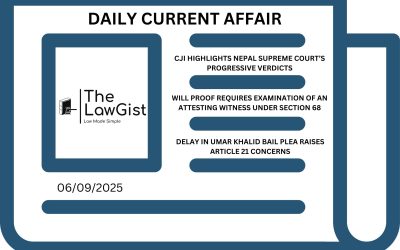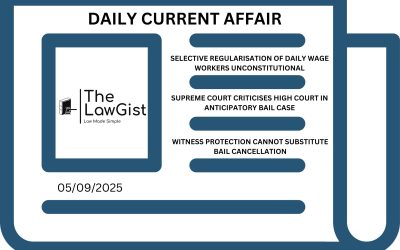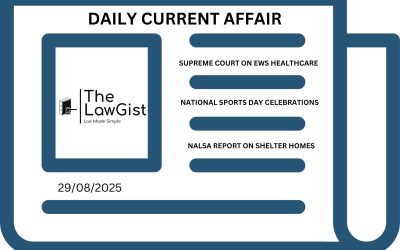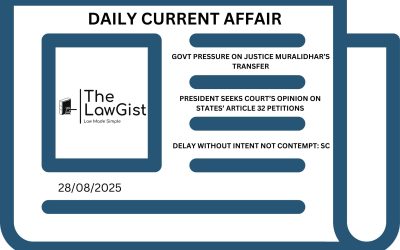
Supreme Court’s key rulings on abetment to suicide, expert evidence, and environmental protection shape India’s legal landscape.
DAILY CURRENT AFFAIRS (6 MARCH 2025)
SUPREME COURT SETS ASIDE CONVICTION IN ABETMENT TO SUICIDE CASE
Case Name: Patel Babubhai Manohardas & Ors. vs. State of Gujarat
The Supreme Court on 5th March while hearing a case based on abetment of suicide quashed High Court ruling on the same stating that mere harassment is not enough for Aboetment of suicide. As per the Apex Court, unless a direct encouragement or proximate act leading to suicide is shown, harassment or disagreements alone are not grounds for conviction under Section 306 IPC. It was highlighted that suicide note only if also not sufficient to prove someone guilty of abetment of suicide.
Legal Provision
- Section 306 IPC: – Abetment of Suicide (BNS Section 45-60)
- Ramesh Kumar vs. State of Chhattisgarh (2001) 9 SCC 618: There must be direct instigation for commiting suicide.
- Keshav Dutt vs. State of Haryana (2010) 9 SCC 286: There must be evidence which should support the case directly or indirectly.
Source: Supreme Court of India
SUPREME COURT HOLDS EXPERT HANDWRITING EVIDENCE REQUIRES CAUTION
Case Name: C. Kamalakkannan vs. State of Tamil Nadu Rep. by Inspector of Police C.B.C.I.D., Chennai
According to the Supreme Court, expert handwriting testimony needs to be thoroughly examined and cannot be taken at face value. It underlined that expert testimony needs to be verified when needed because it is not faultless, especially when it comes to handwriting identification. In this instance, the appellant was acquitted due to the lack of the original document.
Legal Provision
- Section 45 Evidence Act: Courts must exercise caution in relying on expert opinions.
- Murari Lal vs. State of M.P. (1980) 1 SCC 704 Expert testimony should be scrutinized and may require corroboration.
- Section 120B, 468, 471 IPC: Charges of criminal conspiracy, forgery, and using forged documents must be substantiated with credible evidence.
Source: Supreme Court of India
SUPREME COURT ORDERS TREE CENSUS IN TAJ TRAPEZIUM ZONE
Case Name: MC Mehta vs. Union of India & Ors.
To comply with Uttar Pradesh Protection of Trees Act, 1976, the Apex Court ordered Tree Census in Taj Trapezium Zone (TTZ). To enforce laws in the zone it is required to have accurate data. So FRI (Forest Research Institute) is selected to conduct the survey and collect the data for the same. The Uttar Pradesh Protection of Tree Act is meant to protect and make provisions for violation of trees, that can be done only if we have correct data for the same.
Legal Provision
- The Uttar Pradesh Protection of Trees Act, 1976, regulates tree cutting, requiring prior permissions and imposing penalties for violations.
- Supreme Court Order (May 8, 2015): Mandates no tree felling in TTZ without prior court permission.
- Environmental Protection Laws: The Court actively monitors illegal deforestation in sensitive zones.
Source: Supreme Court of India
Also Read: DAILY CURRENT AFFAIRS (5 MARCH 2025)







